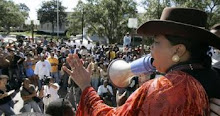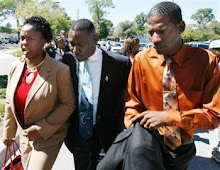
CBS NEWS
Article
Examiner Who Performed first Autopsy Testifies Sickle Cell Trait Caused Teen's Death
October 10, 2007
(CBS/AP) The medical examiner who performed the first autopsy on a 14-year-old boy who died at a Florida juvenile boot camp testified Wednesday in the manslaughter trial of seven guards and a nurse that he found no signs of serious injury or trauma.
Martin Lee Anderson's cause of death was from internal hemorrhaging brought on from sickle cell trait, a previously undiagnosed blood disorder that can limit cells from carrying oxygen during physical stress, Dr. Charles Siebert testified.
Prosecutors say the guards suffocated Anderson during a beating by covering his mouth, making him inhale ammonia and failing to respond to his medical distress.
Earlier, Judge Michael Overstreet told the boy's father, Robert Anderson, to leave the courtroom, saying he was making noise. Anderson said during a lunch break he did not make any noises in court and blamed the disruption on a text message he said defense attorneys sent to someone seated near him.
Earlier Wednesday, the boy's mother, Gina Jones, sobbed loudly and briefly left the courtroom, saying "I cannot take it" as a guard described striking the teen's arm in a videotaped altercation. She declined to speak to reporters outside court.
The parents have repeatedly watched a video of the guards hitting and kneeing the limp, unresponsive boy.
The teen's death in 2006 and the 30-minute beating led Florida lawmakers to order that all such camps be shut down.
Guard Charles Enfinger described Wednesday the repeated hammer blows he delivered to Anderson's arm after the teen collapsed while running laps. Enfinger said that he and others were trying to "motivate" the boy.
Attorney Robert Sombathy asked Siebert whether "knee strikes, arm-bar takedowns, pressure points, ammonia capsules or yelling in loud voices," led to Anderson's death.
"No it did not," Siebert said.
Although it seemed "counterintuitive" the strikes were actually arousing Anderson and "probably keeping him alive," Siebert said.
Two medical experts, including one who performed a second autopsy after Anderson's body was exhumed as part of the investigation into his death, testified for the prosecution earlier in the trial that they believed the guards actions did contribute to Anderson's death.
One doctor said the Anderson died from a combination of his blood cells sickeling and from a lack of oxygen caused by the guards. A second doctor said the guards' clamping their hands over Anderson's mouth and depriving him of oxygen would have killed him without the underlying sickle cell trait.
Guard Henry McFadden testified that Anderson asked to be taken to a hospital during the 30-minute ordeal and told the guards he could not breathe or see. But he and other guards have said they thought the boy was faking his problems.
Also Wednesday, guard Joseph Walsh II testified that he noticed Anderson on the boy's first day at the camp because he used profanity.
"There is no profanity at the boot camp," Walsh said. "They are instructed not to speak without permission to speak."
Walsh said that began the chain of events, which ended when Anderson was carried off by paramedics on a stretcher.
When Anderson's body went limp, Walsh said, he suspected Anderson of feigning illness because that was something common among the youths in the camp.
"Had you seen this before in the boot camp? Was this a common tactic in the boot camp, to go completely limp like a rag doll," asked Robert Pell, Walsh's attorney.
Walsh said it was.
Walsh also said he threw the ammonia capsules he used on Anderson over the camp fence because they had the teen's saliva on them and he did not want to put them in his pocket.
The guards and nurse face up to 30 years in prison if convicted of aggravated manslaughter of a child.
This case has spurred action from a House panel that begin looking into charges of child abuse and neglect at residential treatment facilities.
Testimony is expected from parents whose children have died in boot-camp programs. The lawmakers will consider whether the privately run facilities should fall under federal regulation.





